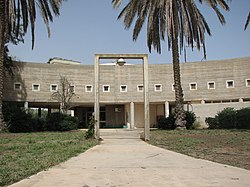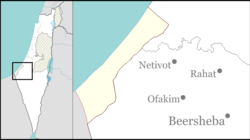Kerem Shalom (Hebrew: כֶּרֶם שָׁלוֹם, "Vineyard of Peace") is a kibbutz in southern Israel. Located on the triple Gaza Strip-Israel-Egypt border, it falls under the jurisdiction of Eshkol Regional Council. In 2022 it had a population of 220.[1]
Kerem Shalom
כֶּרֶם שָׁלוֹם كرم أبو سالم | |
|---|---|
 | |
| Etymology: Vineyard of Peace | |
| Coordinates: 31°13′40″N 34°17′05″E / 31.22778°N 34.28472°E | |
| Country | Israel |
| District | Southern |
| Council | Eshkol |
| Affiliation | Kibbutz Movement |
| Founded | 1967 (original) 2001 (re-establishment) |
| Founded by | Hashomer Hatzair members |
| Population (2022)[1] | 220 |

History
editThe kibbutz was established in 1967 by members of Hashomer Hatzair, a socialist-Zionist youth movement. The name "Kerem Shalom" is Hebrew and translates to "Vineyard of Peace." The founders chose this name with the hope that the kibbutz would play a role in establishing peace and ending the Arab-Israeli conflict.[citation needed]
Haaretz described it as "a small community with a communal-secular way of life, which marks holidays and holds culture evenings together and observes total mutual responsibility - in education, culture, health and its economy." According to Ilan Regev, the community manager, "the kibbutz, which was founded in 1967, fell apart in 1995, after members left, but in 2001, it was reestablished." In 2011, the kibbutz had 35 members and candidates (families and individuals), about 30 children and eight members of a youth movement on a year of service prior to serving in the IDF. Eight families joined the kibbutz after Operation Cast Lead. The kibbutz started a campaign in 2011 to attract new residents, called "Zionism 2011". Proximity to the Gaza Strip, being subjected to Palestinian mortar attacks and its association with the abduction of Gilad Shalit, which happened close by, has resulted in the kibbutz struggling to increase its membership according to Regev. He described the kibbutz as "unique in the country in an area that in effect determines the borders of the state, the way it was at the start of Zionism, with an attempt to shape a just and egalitarian society." The Israeli government required the kibbutz to populate at least 40% of the 100 allocated residential slots within a specified time which, according to Regev, required 80 new members and candidates. The state can reduce the "means of production—land, water and the like" if its requirements are not met.[2]
In March 2006, the Avian influenza virus was identified in turkey coops in Kerem Shalom.[3]
In 2008, the kibbutz was bombarded by mortar shells in an attack described as the worst since the Israeli disengagement from Gaza. Although a mortar shell hit the electricity infrastructure, several families insisted on celebrating the Passover seder at the kibbutz dining hall.[4]
The kibbutz was again attacked by Hamas in 2023. Its 10-person civil defense team engaged the attackers. At least 20 Hamas gunmen and two members of the civil defense team were killed.[5] Over the following months, Israeli and Palestinian aid trucks have been attacked by rioters here.[6][7]
See also
editReferences
edit- ^ a b "Regional Statistics". Israel Central Bureau of Statistics. Retrieved 21 March 2024.
- ^ Yanir Yagna (31 May 2011). "Kibbutz Kerem Shalom looking for a few good Zionists willing to settle right next to the Gaza Strip". Haaretz.
- ^ Bird flu discovered in Kibbutz Kerem Shalom, Jerusalem Post, March 31, 2006
- ^ Kerem Shalom residents vow not to leave Ynetnews
- ^ Young dad of 6 absorbed blast to protect family in attack on Kerem Shalom
- ^ Borger, Julian (17 May 2024). "Supplies arrive in Gaza via new pier but land routes essential, says US aid chief". The Guardian.
- ^ Tondo, Lorenzo; Taha, Sufian; Burke, Jason (16 May 2024). "'Barbaric': Palestinian lorry drivers recount settlers' attack on Gaza aid convoy". The Guardian.
External links
edit- Kerem Shalom Negev Information Centre

